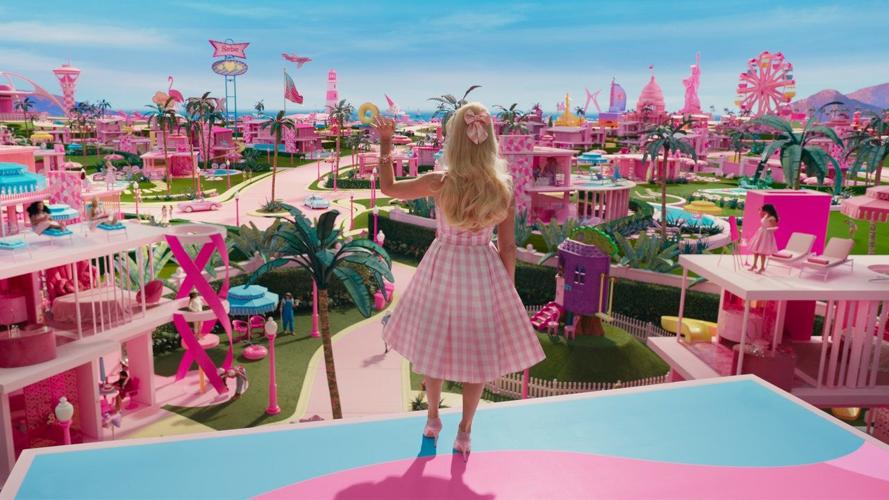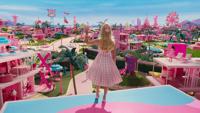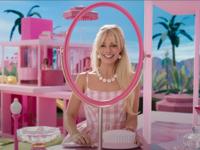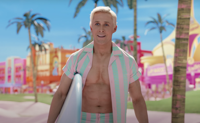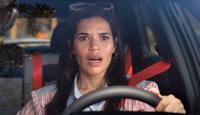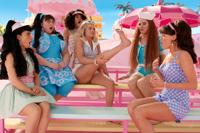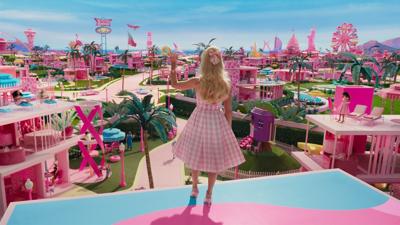Mattel is the world's second largest toy maker in terms of revenue. It's only second to the Lego Group. Ruth Handler and her husband created the company in 1945. In fact, the company is named after Ruth's husband and their co-founder Harold Matson. The company started by selling dollhouse furniture. It introduced the Barbie doll in 1959, which became its best-selling toy in history. The company found success with toy cars like Hot Wheels and even other action figures like He-Man. Mattel's first attempt at making a big-budget film, based on one of its toys, came with the live-action adaptation of He-Man for Masters of the Universe (1987).
That film treated the characters of He-Man as real people, but there was still a narrative there of He-Man and his friends traveling from their world into what could be considered the real world. It's about those toyetic characters trying to understand the real world as a kind of fish-out-of-water tale and the culture clash they experience. Mattel apparently liked that narrative, so they had director and co-writer Greta Gerwig repeat that story here, or perhaps Gerwig decided to pay homage to that previous Mattel film.

Margot Robbie (The Suicide Squad and I, Tonya) stars as Barbie, a woman who lives in Barbieland, a fantasy world comprised of a diversity of women all named Barbie. Aside from ethnicities and body types, they're distinguished mainly by their jobs. Robbie's Barbie doesn't really have a specific job. She's simply referred as "stereotypical Barbie." She's the prototype or the archetype for all the others. She also exists as a standard of beauty and if she does have a job, it's simply to be that standard.
The aesthetic of Barbieland is bright, shiny and plastic. There's a 1960's and 70's sheen or vibe to everything to correspond to the time period where the toy was at its height. Much like a Wes Anderson film, there is also a dollhouse aesthetic to Barbieland, a literal one. It's as if someone took the toy accessories that Mattel designed for its signature product and expanded their sizes to fit or accommodate human beings. It's also as someone describes like a town in Sweden.

Ryan Gosling (La La Land and The Notebook) co-stars as Ken, the literal, live-action adaptation of the male companion for the Barbie toy. Much like the characters in Pixar's Toy Story (1995), Ken and all the others in Barbieland know that they're toys. The difference is that they're living in a world separated from the real world, and Ken along with all the others realize this. They have no desire to go to the real world because for Ken and the others, Barbieland is perfect.
Like stereotypical Barbie, Ken is a stereotypical surfer bro. He has no job other than looking attractive and hanging out at the beach. It's slowly revealed to him that the reason he doesn't have a job is because the women in Barbieland are the ones with any kind of substantial profession. The men in Barbieland who are all named Ken are not much more than accessories themselves. He realizes that Barbieland is a matriarchal society, which suits all the men fine, as long as the women show them attention. Things take a turn when stereotypical Ken isn't getting attention any more from stereotypical Barbie.

America Ferrera (Superstore and Ugly Betty) also co-stars as Gloria, a secretary at Mattel who used to love playing with Barbie as a little girl. She even tried sharing it with her teenage daughter, Sasha, played by Ariana Greenblatt (65 and Love and Monsters). Yet, as Sasha has gotten older, she's rejected Barbie as a toy, and a lot of the modern-day feminist or fourth-wave feminist criticisms of Barbie exist in Sasha. This has caused Gloria to feel depressed as Gloria agrees with those criticisms and recognizes the greater issues with the patriarchy of the real world, but she still loves her Barbie.
If this were Toy Story, Gloria is the equivalent to Andy. However, Toy Story was all about the toys keeping the fact that they were really alive a secret from Andy. Here, Gloria learns the truth and the film is smartly about Gloria reckoning with the issues that Barbie's existence brings to the surface and how she should handle them.

In a lot of ways, this film is grappling with a lot of the same issues that Olivia Wilde's Don't Worry Darling (2022) grappled. Wilde's film involved women being brainwashed into being subservient to men or submitting to a patriarchal society. Gerwig's film involves the same thing. I compared Wilde's film to Lana Wachowski's The Matrix Resurrections (2021) because there's a similar aspect, particularly a science-fiction aspect. Gerwig's film doesn't have a sci-fi component. It's pure, silly fantasy.
Gerwig and her co-writer Noah Baumbach (Marriage Story and Fantastic Mr. Fox) make the tone here silly. The comedy ranges from cinematic parody, such as mocking Stanley Kubrick, to double entendres pointing out sexism, to sharp satire of consumerism. Sometimes, Gerwig's film is winking at the screen. Sometimes, her film is zany like something out of a cartoon. However, she's able to weave it all together into what's the funniest film of the year, funny film about depression and misogyny.

What's helped is a great supporting cast, including Kate McKinnon (Bombshell and Ghostbusters) who plays weird Barbie, basically being iconic McKinnon. There's Will Ferrell who's doing something akin to what he was doing in The Lego Movie (2014), which also has a similar aspect to what's happening here, that of bringing toys and what they represent into the real world.
Rated for PG-13 for suggestive references and brief language.
Running Time: 1 hr. and 54 mins.
In theaters.


